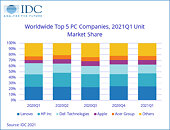Tuesday, June 15th 2021

Spurred by M1 Performance, Apple Doubles Shipments of Mac Computers
The M1 chip is usually found at a perception crossroads: fans of Apple tout its desktop CPU-level performance numbers in some workloads while comparatively sipping power (and even allowing for true fanless designs in the Apple Macbook Air), while non-fans are quick to point out that synthetic benchmarks aren't truly representative of performance. Whatever side of the fence you sit on (even if you straddle it by admitting that the M1 chip can actually outperform much more powerful and core-laden Ryzen CPUs in some specific workloads), the M1 has been a running success for the California-based company. So much so, in fact, that Apple more than doubled its shipments (a 111% increase) in 2021 compared to the previous year. The second manufacturer with the highest shipment growth is Acer, with 73% - and a slightly smaller overall shipment volume.
The success of Apple's M1 only served to increase Apple's confidence in its decision to abandon Intel, and the company is expected to announce the M1's successor sometime this year. Furthermore, a new version of MacOS further increases the divide to Intel-based Macs due to some features only working on their M1 counterparts. When you consider all of that, including the accelerating optimization of many applications for the platform (Capture One, Affinity, and most recently Adobe), the platform maturity that has been achieved in such a short while, and the announcement of even more powerful hardware for content creators, it may be the case that Apple actually keeps up its momentum and presents a rather competitive landscape to the Windows + x86 PC ecosystem (I won't use Wintel because that's, well, inaccurate and unfair to AMD). Apple is surely on the way to carve out more than its current 15,84% market share (which still places it in a second-place in the overall OS market).
Sources:
IDC, Spectrum IEEE, Stat Counter
The success of Apple's M1 only served to increase Apple's confidence in its decision to abandon Intel, and the company is expected to announce the M1's successor sometime this year. Furthermore, a new version of MacOS further increases the divide to Intel-based Macs due to some features only working on their M1 counterparts. When you consider all of that, including the accelerating optimization of many applications for the platform (Capture One, Affinity, and most recently Adobe), the platform maturity that has been achieved in such a short while, and the announcement of even more powerful hardware for content creators, it may be the case that Apple actually keeps up its momentum and presents a rather competitive landscape to the Windows + x86 PC ecosystem (I won't use Wintel because that's, well, inaccurate and unfair to AMD). Apple is surely on the way to carve out more than its current 15,84% market share (which still places it in a second-place in the overall OS market).


46 Comments on Spurred by M1 Performance, Apple Doubles Shipments of Mac Computers
Apple makes the OS, the kernel, the m1 SOC, and the final product: the mac/iPhone/iPad. It takes a lot of courage and talent to be vertically integrated, but it’s paying off as Apple can deeply integrate its OS and its cpu. I do hope AMD and Intel continue to innovate and bring even more performance increases to x86.
As an Apple Shareholder, I agree!
M1 is pretty impressive. Great for a versatile desktop while remain cool and quiet.
Would be nice to figure out the sensors or tuning for M1. Overclocking M1 would be fun
I was under the impression that what made M1 look impressive is how Apple's OS and apps are designed to utilize M1 better over Intel's x86 CPUs they were using.